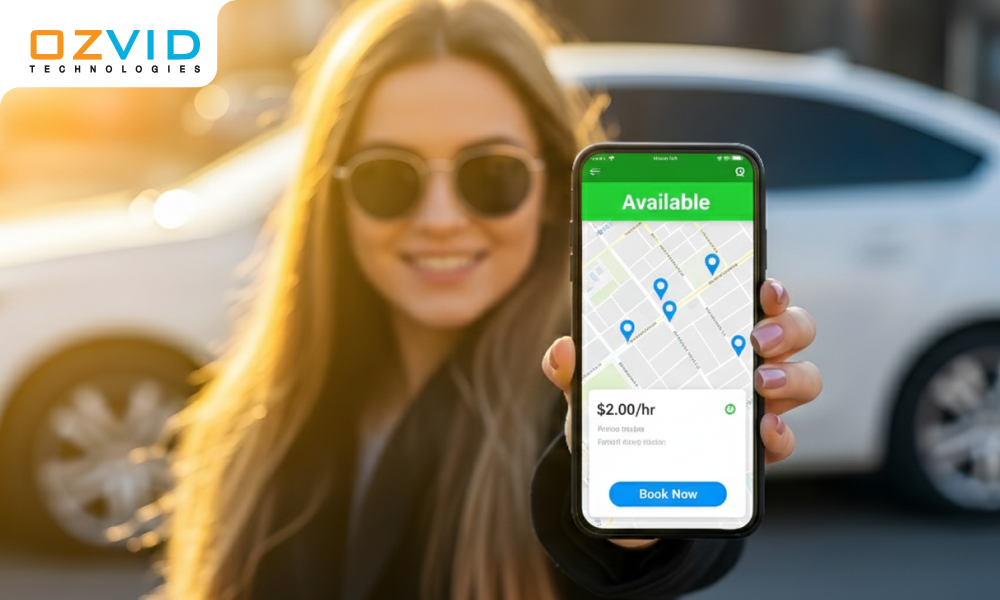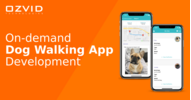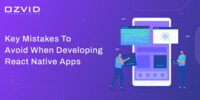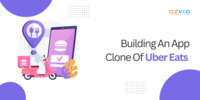- Jan 20, 2026
Share this post on:

Did you know the global smart parking market size is estimated to reach USD 30.16 billion by 2030, growing at a CAGR of 22.1%? In today’s fast-paced urban lifestyle, finding a suitable parking spot has become a major challenge for drivers. With the growing number of vehicles and limited parking spaces, the demand for smarter and more efficient parking solutions has skyrocketed. This is where a parking app steps in as a game-changer. By leveraging technology, an on-demand parking app allows users to find, reserve, and pay for parking spaces seamlessly - reducing time, fuel consumption, and frustration.
Businesses across industries are now investing in parking app development to deliver convenience, boost customer satisfaction, and tap into a fast-growing market. As one of the most innovative and scalable digital solutions, a parking mobile app simplifies city parking, enhances user experience, and generates steady revenue for businesses.
In this detailed guide, OZVID Technologies explores the cost, features, process, and benefits of developing an on-demand parking app like SpotHero, ParkWhiz, or ParkMobile. Whether you are a startup or an established enterprise, this article will help you understand the complete picture of building a next-gen car parking app for your business.
Key Takeaways
- A well-built parking app simplifies parking management, enhances user experience, and reduces city congestion.
- The cost to develop a parking app depends on features, technology, and platform choice, ranging between $25,000–$100,000+.
- Parking app development offers strong business potential through automation, analytics, and multiple revenue streams.
- Smart on-demand parking apps improve operational efficiency and promote eco-friendly urban mobility.
Importance of Parking App Development for Businesses
1. Growing Urbanization and Parking Challenges
With the number of vehicles rising daily, parking congestion has become a global issue. Drivers often waste valuable time searching for parking spaces. A parking app addresses this challenge by providing real-time information about available parking spots nearby, ensuring smooth and efficient parking management.
2. Enhanced User Experience
A well-designed parking mobile app provides users with a seamless experience — from finding the nearest parking lot to making digital payments and receiving instant confirmation. This convenience increases customer loyalty and retention, making parking solutions a profitable investment for businesses.
3. Data-Driven Parking Management
Parking app development allows business owners to gather valuable data such as peak parking hours, user preferences, and location-based demand. This information helps optimize pricing strategies and improve operational efficiency.
4. Monetization and Business Opportunities
The on-demand parking app industry presents lucrative opportunities. With multiple revenue streams such as commissions, subscriptions, and advertising, a well-structured app parking system can become a steady source of income. Businesses can collaborate with private parking providers, malls, and municipalities to expand their network.
5. Supporting Smart City Initiatives
As cities transition to smart infrastructure, integrating an intelligent parking app becomes essential. These apps reduce traffic congestion, pollution, and unnecessary fuel consumption while promoting sustainability - aligning perfectly with modern smart city goals.
Features of a Parking App
A successful parking app includes three primary panels - User Panel, Admin Panel, and Driver Panel - each designed with specific features to ensure smooth operations, better management, and improved user experience.

1. Parking Owner Panel Features
The user panel focuses on providing drivers and customers with a seamless and convenient parking experience. Here are five essential features:
a. Easy Registration and Login
Users can sign up using their email, phone number, or social media accounts. A quick onboarding process encourages higher app adoption and engagement.
b. Real-Time Parking Availability
The app displays live updates of nearby parking spaces using GPS and sensors, helping users find available spots quickly and save time.
c. Booking and Reservation System
Users can pre-book parking slots in advance, select duration, and make instant payments, ensuring a hassle-free experience.
d. Multiple Payment Options
The parking mobile app allows users to pay through various methods like credit/debit cards, UPI, e-wallets, or integrated payment gateways for maximum convenience.
e. Ratings and Reviews
After each parking session, users can rate the experience and leave feedback. This helps improve overall service quality and builds trust among users.
2. Admin Panel Features
The admin panel serves as the control center for managing users, parking spaces, payments, and app analytics. Here are five key features:
a. Dashboard Management
A centralized dashboard allows the admin to monitor user activity, total bookings, parking availability, and revenue generation in real time.
b. Parking Slot Management
Admins can add, edit, or remove parking spaces, set dynamic pricing, and manage availability status with ease.
c. User and Driver Management
Admins can view and manage user and driver profiles, verify registrations, and handle complaints or disputes directly from the panel.
d. Reports and Analytics
The parking app generates insightful reports related to sales, occupancy rates, and user behavior, helping businesses make data-driven decisions.
e. Offers and Promotions Management
Admins can create promotional campaigns, loyalty rewards, and discount codes to attract and retain users.
3. Customer Panel Features
The driver panel is designed for parking attendants or service providers responsible for managing vehicles and space allocation efficiently. Key features include:
a. Driver Authentication
Each driver or attendant can securely log in and manage assigned parking lots, ensuring only authorized personnel access the system.
b. Parking Request Management
Drivers receive booking notifications, accept or decline requests, and manage parking assignments efficiently.
c. Real-Time Navigation
Integrated GPS helps drivers guide users to their reserved parking spot or locate available spaces within a specific area.
d. Vehicle Check-In and Check-Out
The on-demand parking app allows drivers to scan vehicle details using QR codes or number plates, maintaining proper entry and exit logs.
e. Earnings and Performance Tracking
Drivers can view their daily earnings, completed bookings, and performance analytics to maintain transparency and motivation.
Cost to Develop a Parking App
The cost to develop a parking app depends on multiple factors, including its design, platform choice, feature set, complexity, and development region. Since every parking app serves different business goals, the total cost varies based on customization level and technology integration.
Developing an on-demand parking app like SpotHero, ParkWhiz, or ParkMobile requires strategic planning, an experienced team, and a strong technology foundation. Whether you aim to create a simple MVP or a feature-rich enterprise-grade platform, understanding the cost components helps you make informed decisions and plan your investment effectively.
1. Factors Influencing the Cost of Parking App Development
Let’s explore the major cost-driving factors that affect the overall parking app development budget:
a. App Design (UI/UX)
A well-designed and visually appealing interface enhances user engagement and satisfaction. Interactive maps, smooth navigation, and an intuitive booking experience are essential.
Estimated Cost: $5,000 – $10,000
Impact: A user-friendly design improves app retention and customer trust.
b. Development Platform
The platform you choose significantly affects the total cost.
Native Apps (Android or iOS): Built separately for each platform, offering high performance but at a higher cost.
Cross-Platform Apps: Built using frameworks like Flutter or React Native, allowing faster development and reduced cost.
Estimated Cost: $15,000 – $30,000 for single platform; $40,000 – $70,000 for both.
c. App Features and Functionality
The more complex your parking mobile app, the higher the cost. Basic features like booking and payment are essential, but adding advanced features like IoT sensors, real-time tracking, and predictive analytics increases the budget.
Estimated Cost: $10,000 – $25,000 (depending on complexity).
d. Technology Stack
A robust technology stack ensures the app is fast, secure, and scalable.
Commonly used tech stack for parking app development includes:
Frontend: Flutter, React Native
Backend: Node.js, PHP, or Python
Database: Firebase, MongoDB, MySQL
APIs/Cloud Services: AWS, Google Maps, Stripe
Estimated Cost: $5,000 – $10,000
e. Development Team Composition
Hiring the right team determines the success and efficiency of your project. A professional parking app development team usually includes:
- Project Manager
- UI/UX Designer
- Backend & Frontend Developers
- QA Engineer
- DevOps Expert
Estimated Cost: $20,000 – $50,000 depending on team experience and location.
f. Location of Development Team
Development rates differ based on geographic regions:
USA / Canada: $80 – $150 per hour
Europe: $60 – $100 per hour
Asia (India): $25 – $60 per hour
Choosing a trusted development company like OZVID Technologies in India helps you save up to 60% on total costs while maintaining world-class quality.
g. Maintenance and Post-Launch Support
Even after the parking app goes live, continuous updates, bug fixes, and performance monitoring are essential for smooth operation.
Estimated Cost: 15–20% of the total annual development cost.
2. Average Cost Estimation Table
Below is an estimated cost breakdown for developing a parking app:
Development Component | Description | Estimated Cost (USD) |
|---|---|---|
UI/UX Design | App interface design, wireframes, and user flow | $5,000 – $10,000 |
Frontend & Backend Development | Core functionality, API integration, and business logic | $15,000 – $30,000 |
Platform Choice | Android, iOS, or Cross-Platform development | $10,000 – $25,000 |
Database & Server Setup | Database architecture, cloud integration, and performance optimization | $5,000 – $10,000 |
Advanced Features (IoT, GPS) | Real-time tracking, sensor integration, and analytics | $10,000 – $20,000 |
Testing & QA | Manual and automated testing for bug-free experience | $3,000 – $7,000 |
Deployment & Launch | App store publishing, configurations, and marketing setup | $2,000 – $5,000 |
Maintenance & Support | Updates, bug fixes, and post-launch services | $5,000 – $10,000/year |
Total Estimated Cost: $25,000 – $80,000
3. Cost Based on App Complexity
App Complexity | Key Features Included | Estimated Cost Range (USD) |
|---|---|---|
Basic App (MVP) | User login, basic search, booking, payment, notifications | $25,000 – $35,000 |
Medium-Level App | Real-time updates, admin panel, GPS navigation, reviews | $35,000 – $55,000 |
Advanced App | IoT integration, predictive analytics, multiple panels, AI support | $55,000 – $80,000+ |
Steps to Develop a Parking App
Developing a feature-rich and scalable parking app in canada involves a strategic process that combines market research, cutting-edge technology, and seamless user experience. At OZVID Technologies, our team follows a systematic and agile approach to ensure that every on-demand parking app we build delivers superior performance and meets client expectations.

Below are the key steps involved in developing a successful parking app from concept to launch.
1. Market Research and Analysis
The foundation of a successful parking app development project lies in thorough market research. This step involves studying user demands, competition, and existing market gaps to identify unique opportunities.
At OZVID Technologies, we conduct comprehensive market analysis to ensure your parking mobile app stands out in the competitive landscape.
Key Activities Include:
- Competitor Analysis: Study top-performing apps like SpotHero, ParkMobile, and ParkWhiz to understand their features and user strategies.
- Target Audience Research: Identify user demographics, parking challenges, and preferences in specific regions.
- Market Gap Identification: Discover unique value propositions and innovative features to differentiate your parking app from others.
2. Defining the App Concept and Business Model
Once market insights are gathered, the next step is to define a clear concept and sustainable business model for your on-demand parking app. This helps in aligning your vision with technical execution.
Our team at OZVID Technologies works closely with clients to shape a functional and profitable idea into a tangible product.
Key Activities Include:
- Feature Prioritization: Decide between must-have and advanced features such as live tracking, booking, and payment integration.
- Business Model Selection: Choose from commission-based, subscription-based, or hybrid revenue models.
- Goal Definition: Set measurable business goals to track app performance post-launch.
3. UI/UX Design and Prototype Creation
Design plays a critical role in enhancing user engagement. A well-structured and visually appealing design ensures users can easily navigate the parking app and complete bookings without confusion.
At OZVID Technologies, our design experts create intuitive interfaces that combine simplicity, functionality, and elegance.
Key Activities Include:
- Wireframing & Prototyping: Build blueprints to visualize user flow and interaction screens.
- User Interface Design: Create modern layouts, maps, and icons with an emphasis on user convenience.
- Usability Testing: Evaluate design prototypes with real users to ensure a seamless experience before development begins.
4. App Development (Frontend and Backend)
This is the most crucial stage of parking app development, where design meets technology. It includes writing clean code, integrating APIs, and ensuring that the app functions efficiently on all devices.
OZVID Technologies utilizes the latest frameworks and tools to build high-performance parking mobile apps that deliver scalability and reliability.
Key Activities Include:
- Frontend Development: Build responsive interfaces using technologies like Flutter or React Native for smooth cross-platform performance.
- Backend Development: Create a secure and scalable server architecture using Node.js or Python for seamless data management.
- Third-Party API Integration: Integrate Google Maps, payment gateways, and real-time data APIs for enhanced functionality.
5. Testing and Quality Assurance
Before deployment, the parking app undergoes rigorous testing to ensure it’s free from bugs, secure, and performs optimally under all conditions. This step guarantees stability and an excellent user experience.
OZVID Technologies follows a multi-stage testing process to identify and resolve any potential issues before launch.
Key Activities Include:
- Functional Testing: Verify that all app features, from booking to payments, work smoothly.
- Performance Testing: Assess the app’s response time and behavior under high traffic loads.
- Security Testing: Ensure user data, payment details, and communication are fully protected.
6. Deployment and Launch
Once the on-demand parking app passes all quality tests, it’s ready for deployment. This phase includes launching the app on Google Play and Apple App Store with optimized listings and marketing strategies to reach the right audience.
OZVID Technologies ensures a seamless launch process with proper configurations and post-launch tracking.
Key Activities Include:
- App Store Optimization (ASO): Optimize app title, description, and keywords for better visibility.
- Server Setup and Configuration: Ensure smooth hosting and performance scalability.
- Beta Launch and Feedback Collection: Release the app to a small user base for final feedback before the full rollout.
7. Post-Launch Support and Maintenance
App launch is just the beginning. Continuous updates, monitoring, and maintenance are vital to keeping your parking mobile app competitive and user-friendly. Regular updates help fix bugs, introduce new features, and improve performance.
OZVID Technologies provides end-to-end post-launch support to ensure your app remains updated with the latest technology trends.
Key Activities Include:
- Performance Monitoring: Track user engagement, crash reports, and feedback in real time.
- Feature Upgrades: Add new functionalities like EV charging slots, dynamic pricing, or loyalty rewards.
- Bug Fixes and Optimization: Continuously refine the app’s speed, stability, and security.
Benefits of Parking App Development
Developing a parking app offers numerous advantages for both users and businesses. From simplifying the parking experience to generating additional revenue streams, it revolutionizes how cities and drivers manage their parking needs. Here are the key benefits of parking app development:
1. Real-Time Parking Availability
A parking app provides real-time updates on available parking spots, saving users time and reducing frustration. This feature allows drivers to instantly find vacant spaces nearby, eliminating unnecessary driving and congestion in busy city areas.
2. Enhanced User Convenience
With a parking mobile app, users can reserve parking slots in advance, make cashless payments, and navigate directly to their parking locations. This seamless digital experience adds significant convenience, improving user satisfaction and loyalty.
3. Reduced Traffic Congestion
By helping drivers quickly locate parking spaces, an on-demand parking app contributes to smoother traffic flow. It reduces the time vehicles spend idling on roads searching for spots, minimizing carbon emissions and fuel consumption.
4. Increased Business Efficiency
For parking operators and businesses, parking app development automates several manual processes such as ticketing, payment tracking, and spot management. This enhances operational efficiency, accuracy, and overall customer management while reducing human errors.
5. Higher Revenue Generation
A smart parking app creates multiple revenue channels through subscription models, commission fees, partnerships, and premium bookings. Businesses can also integrate dynamic pricing to charge higher rates during peak hours, optimizing overall profitability.
6. Seamless Payment Integration
Through integrated payment gateways, a parking mobile app allows users to pay digitally using cards, wallets, or UPI. This promotes faster, more secure transactions while reducing the need for physical cash handling.
7. Improved Customer Experience
Providing a hassle-free parking process enhances brand reputation and customer retention. A parking mobile application ensures quick booking, navigation, and payment, creating a smooth user journey from start to finish.
8. Data Analytics and Insights
With parking app development, businesses can access valuable insights into customer preferences, booking trends, and peak usage times. This data helps improve service offerings and plan better parking management strategies.
9. Eco-Friendly Urban Management
Parking mobile apps contribute to sustainability by reducing unnecessary driving, fuel waste, and air pollution. Smarter parking reduces city congestion and supports eco-friendly urban mobility initiatives.
10. Scalability and Future Expansion
A custom parking app can be easily scaled as business needs evolve. New features such as EV charging spot booking or AI-based predictions can be added to meet the demands of smart city development.
Monetization Strategies of Parking App
Creating a profitable parking app requires strategic monetization models. Here are some common methods used by successful platforms like SpotHero parking:
1. Commission-Based Model
Charge a small commission on every booking made through the parking app. This is one of the most sustainable revenue sources.
2. Subscription Plans
Offer subscription-based memberships for regular users, providing them with special discounts and reserved slots.
3. Advertising and Partnerships
Collaborate with nearby restaurants, malls, or gas stations to promote their services within your parking mobile app, earning revenue from ads and referrals.
4. Dynamic Pricing
Adjust prices based on demand, timing, or location - increasing profits during peak hours.
5. Premium Listings
Allow parking providers to feature their spaces at the top of search results for additional visibility.
6. API Licensing
Sell access to your parking app’s data API to third-party businesses for integration with navigation or vehicle systems.
Conclusion
Building a powerful and reliable on-demand parking app requires expert planning, innovative technology, and a skilled development team. From identifying the right features to estimating costs and choosing the right tech stack, every step contributes to the app’s success.
At OZVID Technologies, we specialize in parking app development and have helped several businesses create intelligent, data-driven, and scalable parking solutions. Our experienced developers combine cutting-edge technologies with deep industry expertise to design and build parking mobile apps that deliver seamless user experiences and real-world impact.
If you are planning to develop your own parking app, partner with OZVID Technologies to transform your idea into a successful digital product. Get in touch with us today to discuss your project and get a personalized cost estimate for your parking app development in Canada journey.
FAQ's
1. Can AI and IoT integration reduce traffic congestion?
Yes, AI and IoT work together to analyze parking patterns, guide drivers efficiently, and reduce unnecessary driving time, helping minimize urban congestion and emissions.
2. How long does it take to develop a parking app?
Depending on complexity, features, and platform choice, developing a parking app usually takes between 3 to 6 months, including design, development, testing, and deployment stages.
3. How secure are payment systems in parking mobile apps?
Parking apps integrate secure payment gateways using encryption, tokenization, and PCI DSS-compliant systems to ensure safe transactions and protect user financial data.
4. How does AI enhance the performance of a parking app?
AI improves parking app performance by predicting available spots, optimizing space utilization, enhancing route recommendations, and analyzing user patterns for smarter operations.
5. What role does IoT play in parking app development?
IoT sensors detect vehicle presence, monitor space occupancy, and send real-time updates to the parking app, ensuring accurate space availability and efficient parking operations.










